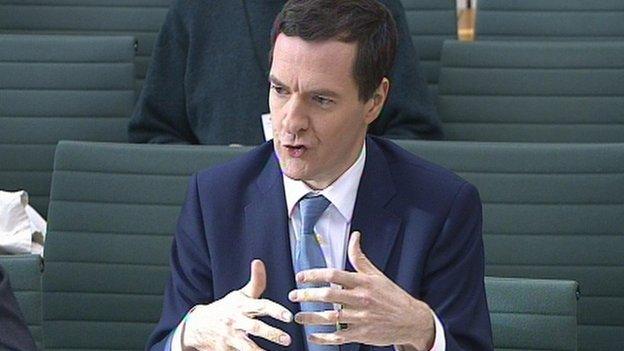Chancellor says new Scots powers could result in UK tax competition
- Published

George Osborne said the Scottish government would have to bear the consequences of using its new powers
Chancellor George Osborne has told MPs that new powers being handed to Scotland could result in a UK-wide competition over tax rates.
The Tory minister was giving evidence to the Treasury select committee which is examining the Smith Commission plan.
Mr Osborne said it would be up to Scotland to decide whether to vary future tax rates and therefore spark "competition".
He added that Holyrood would bear the consequences of using its new powers.
On Thursday the draft Scotland Bill is due to be published.
That represents the next stage in a process to send more powers across the border.
During the Scottish independence referendum campaign, the Tories, Labour and Liberal Democrats vowed to give greater responsibility to Holyrood if voters said "No".
On 18 September, the electorate decided 55% to 45% against change.
Tax thresholds
Lord Smith, who headed the devolution commission, recommended that control over income tax would be shared between the UK and Scottish parliaments.
But within this framework, MSPs would have the power to freely set the rates of income tax and the thresholds of Scottish taxpayers.
Mr Osborne was asked whether that move could lead to "tax competition".
He told the committee: "Ultimately that is a decision primarily for the Scottish Parliament and the Scottish government as to whether they pursue that or not.
"I think it is quite interesting that off the back of the changes we announced at the Autumn Statement to stamp duty that then led to the Scottish government saying it would revisit its proposals on stamp duty.
"You could say that that is a bit of tax competition in action."
The committee quizzed the chancellor in detail about the Smith Commission principle that there there should be no "detriment" to either Scotland or the rest of the UK in regard to tax receipts and spending.
Mr Osborne explained to committee chairman Andrew Tyrie: "The no detriment principle is around the adjustments to the block grant connected with the loss or additional tax revenues that come from the first round effects and potentially behavioural effects.
"But I think it is important, and I think this is fundamental to what everyone is trying to establish here with this further devolution, that people live with consequences of their actions."
He explained that "no detriment" principle should not try be used to "compensate" for "not very clever economic decisions."
Mr Osborne said that deciding on what was "not clever economic decisions" would form part of negotiations between the future UK government and Scottish governments.
He also believed it was important to have a robust and independent fiscal analysis of the public finances in Scotland.
Mr Osborne covered a number of issues during his evidence session, including;
North Sea - he hinted at fresh measures to shore up the Scottish oil industry in the wake of tumbling prices.
Benefits - he said it was made clear in the Smith agreement that key benefits such as universal credit would be reserved to Westminster.
Pensions - he said that although discretionary payments could be used by Scotland it would not be in the spirit of the Smith agreement for Scotland to create a second Scottish top-up pension.

ANALYSIS
By Tim Reid, Westminster political correspondent

The Chancellor has indicated that Scottish MPs would be restricted from voting on some elements of the UK budget under Conservative plans for "English votes for English laws."
George Osborne told MPs that this would be particularly important if Scottish members "held the balance of power" after May's general election.
His comments are at odds - his opponents argue - with what is contained in the Smith Commission on further devolution for Scotland, external which states that "MPs representing constituencies across the whole of the UK will continue to decide the UK's Budget including Income Tax."
Under the Smith Commission a new 'Scotland Bill' would enable the Scottish Parliament to set income tax rates and thresholds.
Giving evidence to the Treasury select committee Mr Osborne denied there was a "disagreement" with the Smith recommendations.
He said it would be wrong to exclude Scottish MPs from deciding elements of the Budget which affected the whole of the UK but would be "unfair" if Scottish MPs decided elements of income tax which did not affect Scotland.
Mr Osborne said he did not want to "pre-empt" proposals on English votes for English laws, which he said would be published shortly but added: "I do think they will have to apply to areas connected with the Budget."